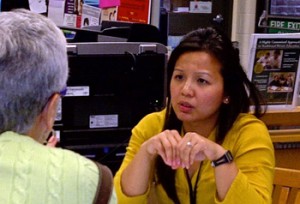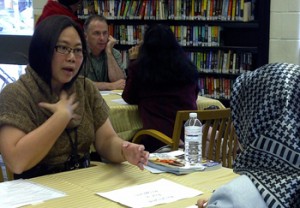Filipina Human Books
Filipina Human Books
LIFE STORIES TOLD AT PARKDALE LIBRARY
Family separation because of the Live-in Caregiver Program and no recognition of foreign credentials were the main chapters of two human books at the Parkdale Library on Saturday Oct. 22.
Carissa Reyes, director of the documentary, My Mother, Your Nanny, and Aurora Rodulfa, a social worker with degrees from the Philippines and Canada, were among the six live books participating in the “Human Library.” That afternoon, patrons of Parkdale Library signed up for thirty-minute talks with the human books to hear their stories.
“Not a lot of people know what Filipino nannies go through,” Reyes said in an interview when asked how people reacted to what she shared. “They’re surprised that they go through so much. They see them in the park but they don’t know the stories that these nannies have,” she continued.
While seated one-one-one at small tables near the large windows of the library overlooking the street, the human books and their “readers” looked like close friends rather than strangers.
Reyes told her readers about her experience as a daughter of a caregiver, and those of women in her documentary.
Reyes said the documentary became part of a healing process for her because her family did not talk much about the separation in the 20 years since she and her mother were reunited. Reyes was three years old when her mother moved to Canada from the Philippines to be a caregiver and eight when she, her sister and dad arrived in Canada.
In the documentary, Reyes parallels her family’s experiences, with caregivers Nancy Quiñon and Yolanda Lacap. At the time of filming, Quiñon was just finishing the Live-in Caregiver Program and was soon to be reunited with her family after 10 years of separation. Lacap was beginning the program that enables foreigners to work as caregivers in Canadian families’ homes.
Women who heard her message took to heart the stories about women working hard, while raising other people’s children, and being separated from their own, said Reyes.
Those Reyes talked to at Parkdale were not Filipino. They were mostly shocked, especially about the length of separation between caregivers and their families. They became interested in knowing more and asked what could be done.
Rodulfa’s story, like Reyes’s, is one of perseverance. After immigrating to Canada in 2005, she found it difficult to find work without Canadian education or experience. “When I go to interviews, they say it’s not at par as what they want the position to be,” she said in an interview.
Rodulfa has a Bachelor’s degree in of Social Work, and a Masters in Management from the University of the Philippines. “It was so difficult for me to get a job even with my Masters and my resume out there saying this is assessed as equivalent.
“As an immigrant you really have to assert yourself,” she said. “You have to do twice the work because people question where your ideas come from when they look at you,” she continued.
Since arriving in Canada, she has been furthering her Canadian qualifications, completing programs at Ryerson University, George Brown College, and non-profit organizations. She is currently doing a Masters in Social Work at the University of Windsor.
When she was asked whether what was taught in Philippine schools was different from Canadian schools, Rodulfa replied, “It’s not different because the way you talk to people in the Philippines is the same way that you would do it here.”
She said she told her readers to “invest in yourself to accomplish your dreams in Canada and education will help you get there.”
The human books share their “oral history of the people’s struggles and how they become successful in their life,” said Flordeliz M. Dandal, Executive Director of Kababayan Community Centre, one of the organizing committee groups of the “Human Library.”
The idea of human libraries began in Copenhagen in the 1990’s. “Living Libraries” was launched by a youth organization called Stop the Violence in reaction to a youth stabbing. The young people wanted to raise awareness on the issue through one-on-one dialogue. Since then, countries worldwide have adopted the idea.
In the information pamphlet, patrons were told the project will allow you to hopefully walk through someone else’s shoes for a few minutes and celebrate differences, allowing you to “broaden your mind and find common ground.”
The Library Settlement Partnership program is funded by Citizenship Immigration Canada, which provides settlement services at libraries with community organizations. The Partnership enables special events like the “Human Library” along with day-to-day collaboration.
The community library is where many newcomers first come for information. Parkdale Library offers many community services such as guided walking tours of the neighborhood and partners with Kababayan for other settlement services.
Parkdale librarian and event organizer, Elton D’Costa, said the experience allows the reader to direct the story in any direction, like choose-your-own adventure books. “With a human book in front of you there are endless possibilities as to where you can take the conversation,” D’Costa said.
Over the three hours of the event, 28 people signed out the six human books, a group that included authors, artists, and educators.


Comments (0)